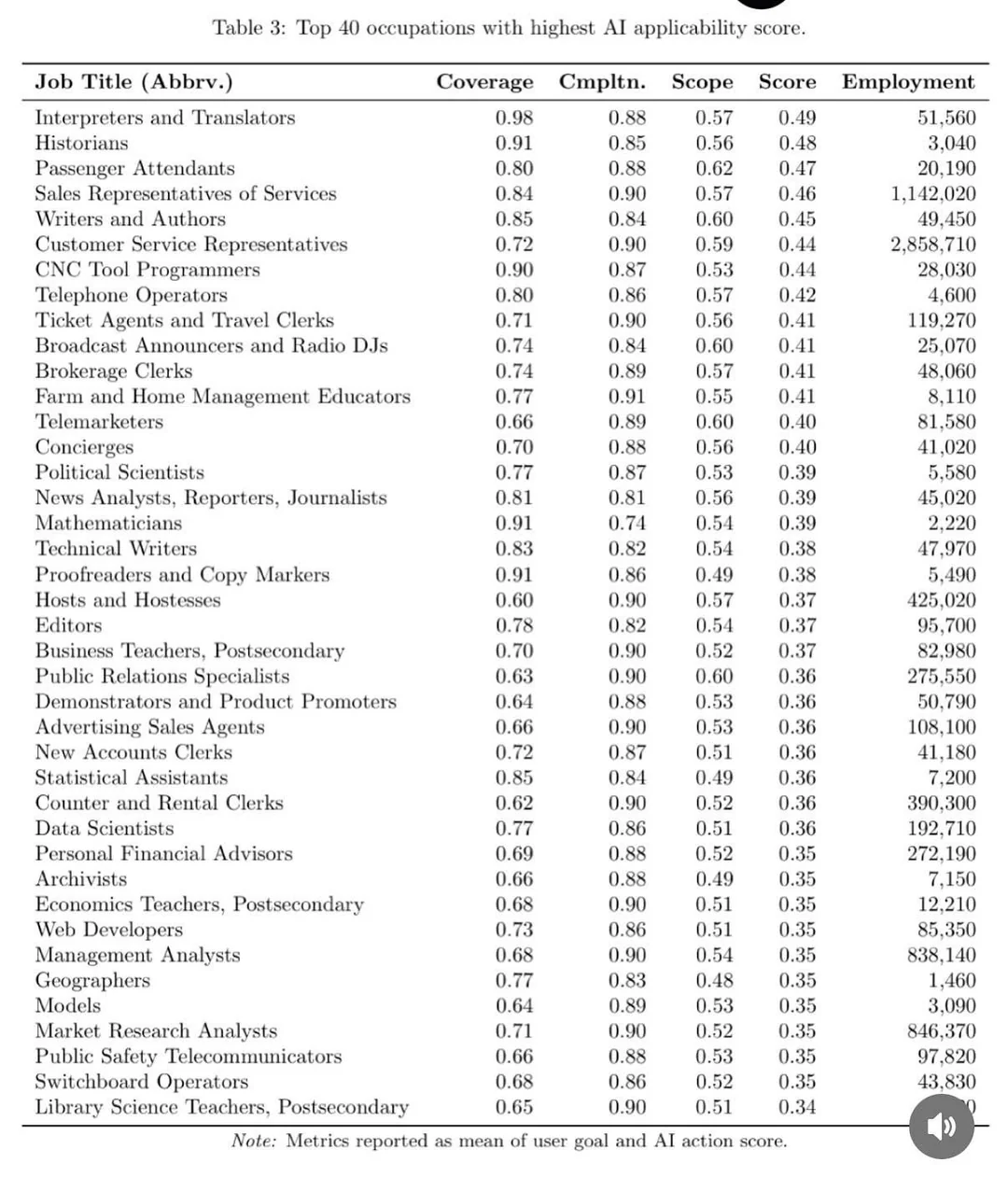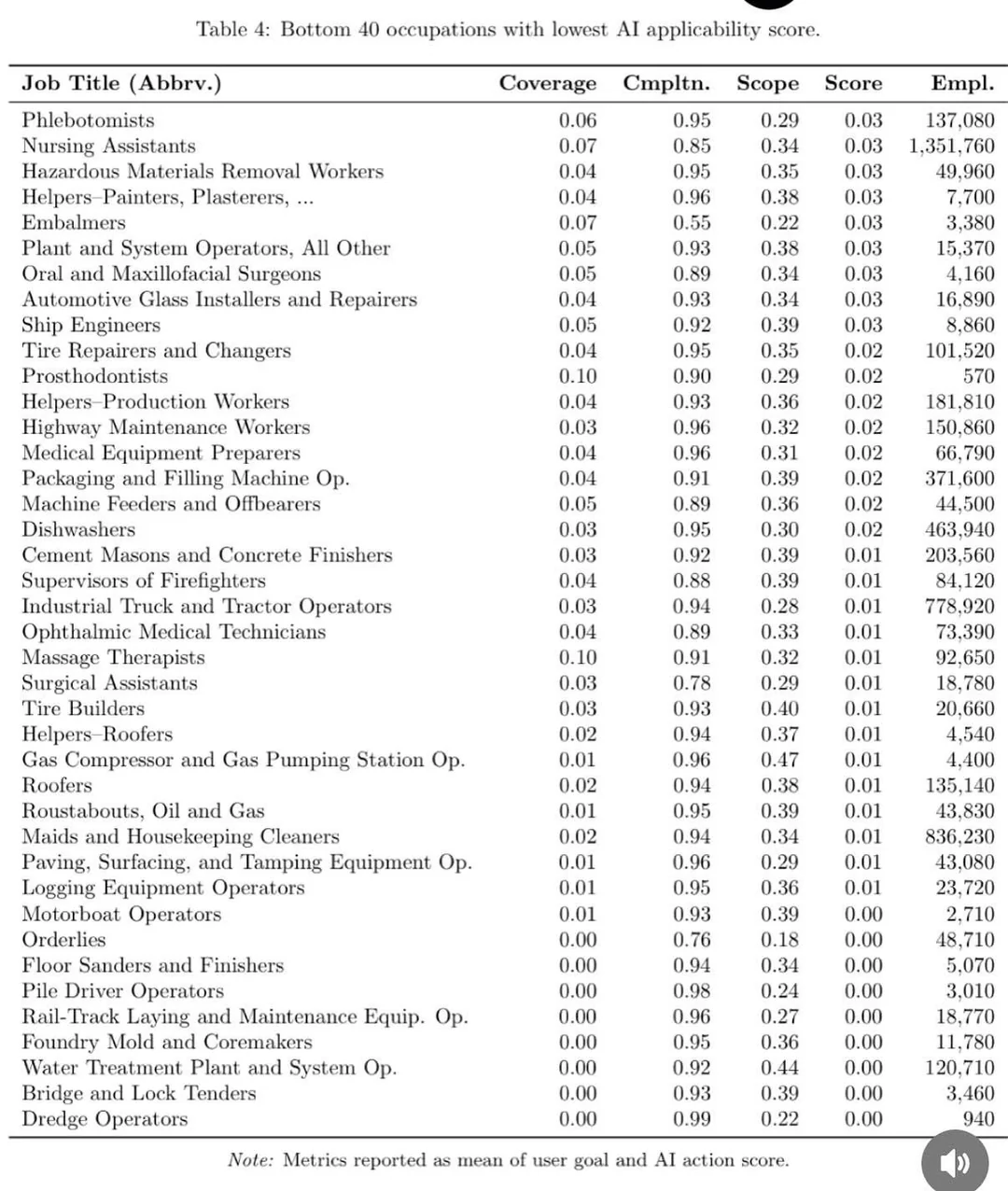Microsoft just dropped a study on the jobs that are most exposed to AI automation and it's not looking good. Some jobs on the list, like historian, don't really add up. But most certainly do.
I’ve been thinking a lot about all of the noise around this topic. Honestly, I’m skeptical when I see claims that entire professions like mathematicians, or writers could be replaced completely.
Creativity, context, and true understanding are still out of reach for algorithms, no matter how clever they seem on the surface. Sure, AI can assist with facts or draft ideas, but genuinely innovative thinking and nuanced interpretation aren’t things you can automate away. Or can you?
It also makes me wonder how much of these studies are about reality and how much are just clever marketing. Perhaps they're attempts to set expectations around job losses or wage changes. The notion that tire builders and embalmers are the safest jobs because AI can’t handle the hands-on or emotional aspects almost feels like dark comedy. Even then, there’s some comfort in knowing not everything can or will be digitized.
From my experience, AI is an extremely valuable tool, but not yet a full replacement. I use AI all the time, even though I feel I'm closer to the innate dangers it poses. It helps speed up researching and has shown a great ability to automate tedious tasks, but I still find that human expertise, judgement, and critical thinking are needed to guide the outputs. Productivity might go up, but someone has to ensure the results are appropriate and make sense in the real world.
Looking further ahead, there are questions about authenticity, cultural nuance, and originality. If machines start producing our history, our stories, or the analytics behind important decisions, is there a risk of losing something essential? Relying too much on AI could mean flattening our culture or undermining deep expertise, especially if corporations lean on these narratives as a pretext for big changes that aren’t actually about technology.
That said, it’s important not to panic or be overly dramatic. Just because AI makes a few tasks easier doesn’t mean whole jobs will vanish overnight. More likely, roles will shift, new skills will become important, and professional life will evolve in unexpected ways. Change is coming, but we’re not headed for a robot takeover. Instead, we’ll continue adapting, questioning, and—when appropriate—finding the humor in a world that’s always part human, part technology.
What jobs are most affected by AI?

What jobs are least affected by AI?

Which jobs will be disrupted by AI?
Interpreters and Translators, Historians, Passenger Attendants, Sales Representatives of Services, Writers and Authors, Customer Service Representatives, CNC Tool Programmers, Telephone Operators, Ticket Agents and Travel Clerks, Broadcast Announcers and Radio DJs, Brokerage Clerks, Farm and Home Management Educators, Telemarketers, Concierges, Political Scientists, News Analysts Reporters Journalists, Mathematicians, Technical Writers, Proofreaders and Copy Markers, Hosts and Hostesses, Editors, Business Teachers Postsecondary, Public Relations Specialists, Demonstrators and Product Promoters, Advertising Sales Agents, New Accounts Clerks, Statistical Assistants, Counter and Rental Clerks, Data Scientists, Personal Financial Advisors, Archivists, Economics Teachers Postsecondary, Web Developers, Management Analysts, Geographers, Models, Market Research Analysts, Public Safety Telecommunicators, Switchboard Operators, Library Science Teachers Postsecondary
How do I prepare myself for the AI world?
Navigating the rise of AI feels overwhelming at times, but there are approachable steps I can take to feel more confident and prepared. Here’s how I’m thinking about it for myself, and what I’d suggest to anyone looking ahead:
1. Stay Curious and Keep Learning AI is moving fast, so I make it a point to stay informed—but not obsessed—with the latest trends. I try to read a bit about how AI is being used in my field and in others. Short videos, articles, or even free online courses can go a long way. The more comfortable I get with basic concepts, the less intimidating it feels.
2. Focus on What Makes Me Unique Creativity, empathy, and big-picture thinking aren’t things AI does well. I invest time in skills that highlight my human strengths: collaborating, problem-solving, and coming up with original ideas. I remind myself that these are often the most valuable contributions I can make.
3. Get Hands-On with AI Tools Instead of being scared of AI, I look for ways to try out the latest tools—whether it’s using a writing assistant, experimenting with image generators, or automating a simple spreadsheet task. This helps me see how AI can save time or spark new ideas, and I get practice adapting to new technology.
4. Embrace Lifelong Learning I accept that jobs and required skills will change. Rather than feeling locked into one pathway, I keep an open mind about learning new things, whether through short courses, on-the-job experience, or just by following my curiosity. Picking up the basics of digital skills and data literacy feels increasingly important.
5. Stay Flexible and Open to Change I recognize that AI will shift how many jobs are done, not just eliminate them. I try to be proactive about adapting my role, thinking creatively about how my work could evolve, and looking for opportunities to grow rather than waiting for change to be forced on me.
6. Focus on Community and Values In a high-tech world, human connection and ethical judgment matter more than ever. I try to build strong relationships at work and in my community, since collaboration, trust, and mutual support never go out of style.
I’m personally preparing for the AI world by blending curiosity with adaptability, and making sure I don’t lose sight of the values and skills that make me human. For me, that’s the surest path to staying relevant—and maybe even thriving—no matter how the technology evolves.
---
Need help implementing AI in your business? I work with companies to turn AI possibilities into practical, profitable solutions. Get in touch to discuss your specific needs.